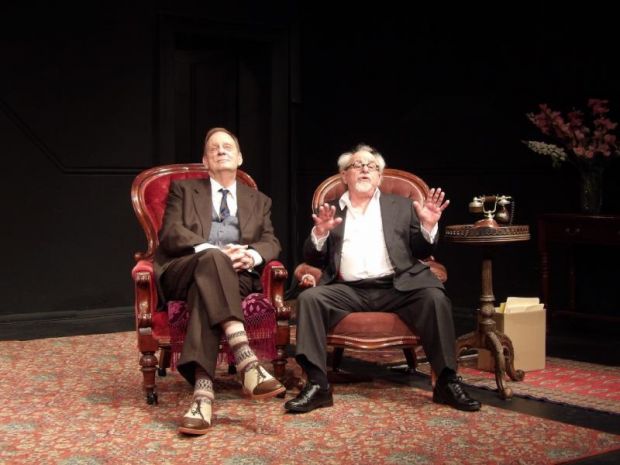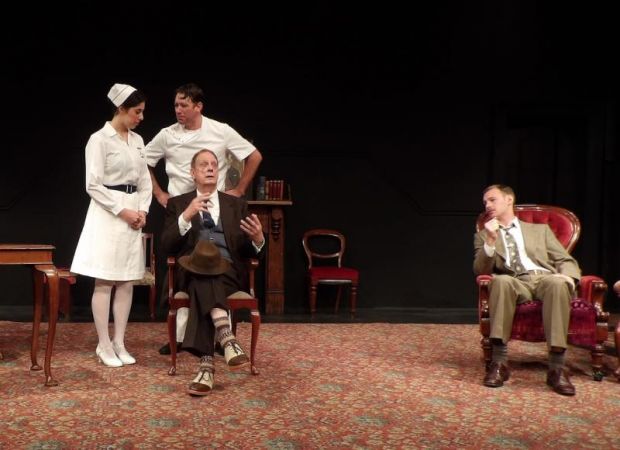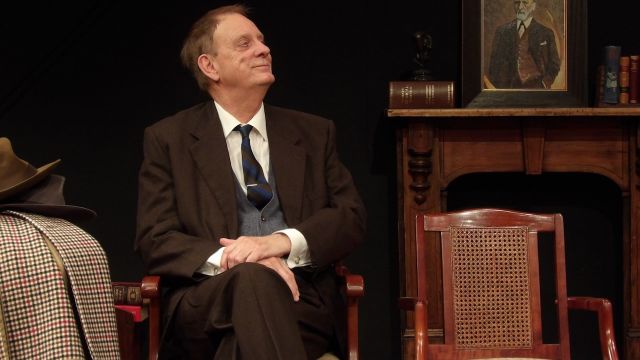Harvey
It is always interesting to see how differently an actor approaches a role that they reprise, and for Peter Goers, this is a passionate revisiting of his role as lovable, gentle and kind Elwood P. Dowd in Mary Chase's Pulitzer Prize-winning comedy, Harvey. Interestingly, it remains the fourth-longest-running play in the history of Broadway.
Elwood P. Dowd, an eccentric man, claims his best friend is Harvey, a 6-foot 3 ½ inch -tall invisible white rabbit, who is a mythical pooka. The fabulous thing about Celtic shapeshifters is that they can be anywhere and can be realised from a range of mythical animals. Dowd’s devotion to Harvey embarrasses his sister Veta and niece Myrtle Mae, who try to have him committed. A mix-up at the sanatorium leads to Veta being locked up instead. The staff discover Harvey’s mysterious influence, and even senior psychiatrist, Dr. Chumley, played with great comedic pizzaz, by Ron Hoenig, becomes convinced Harvey is real. Elwood agrees to receive a serum to make him “normal,” but advice from a mystery taxi driver, alternately played as a clever cameo by Robert Cusenza and Robin Schmelkopf, results in Veta changing her mind after realizing that Elwood’s gentle nature might vanish. The cab driver’s remark about “perfectly normal human beings” flips the idea of sanity, suggesting that kindness and individuality matter more than rigid norms, and is a key message in Harvey.

Director Rosie Aust has focussed on the very human side and modern relevance of this piece, and she has led a crew and design team who have put together an attractive, well-used set that supports action in the two places that the story is told. Costumes suggest the 1944 era, with some notable inconsistences and inaccuracies that fortunately, whilst not enhancing, do not take away from this well-paced piece.
Several actors deliver memorable performances; and in smaller roles, Leighton Vogt as Duane Wilson and Antoinette Cirocco as nurse Kelly are confident, consistent and believable.
As a retired radio personality, Goers is used to steering the action, but in this version, Rebecca Kemp playing long suffering, brittle and somewhat unstable Veta, Dowd’s sister who believes that he needs psychiatric help, leads the cast in a standout performance. The stage feeds on her energy every time she enters, and her distress, and comic timing is palpable. The play, and 1950’s film was nominated, and it is this demanding role that consistently drew the awards.

Many people remember James Stewart’s warm, vulnerable, and almost ethereal portrayal of Dowd, for which he received his fourth academy award nomination. The Jimmy Stewart Museum still presents the "Harvey Award" to recognize distinguished individuals connected to the spirit of humanitarianism, citizenship, service, and family. As an older actor, Goers gives a restrained, self-contained performance and Dowd’ lights up’ when he smiles and grins, making the character lovable and relatable.
At 165 minutes this is a long show that may benefit from judicious pruning, but it’s messages of individuality, kindness, human connection, imagination and the pressures to aspire to social status and acceptance and all too relevant today. Perhaps the only ‘dated’ feature is Veta and Myrtle Mae’s obsession with getting married to become more acceptable.
The inspirational message is ultimately delivered front on, by Dowd who reminds us that being consistently kind and unflappable, fosters the true contentment that comes from embracing one’s uniqueness. In a contemporary world, this is a word to the wise.
Jude Hines
Photographer: Toni Lee
Subscribe to our E-Newsletter, buy our latest print edition or find a Performing Arts book at Book Nook.

